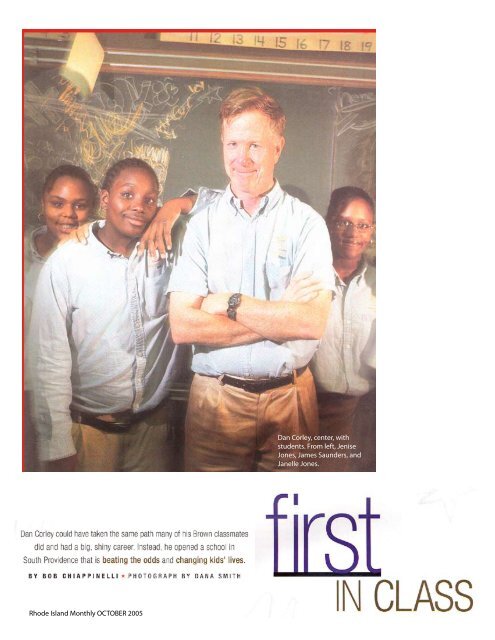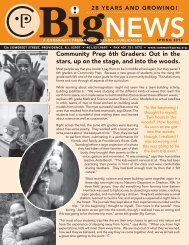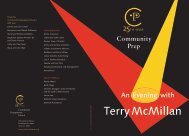Dan Corley, center, with students. From left, Jenise Jones, James ...
Dan Corley, center, with students. From left, Jenise Jones, James ...
Dan Corley, center, with students. From left, Jenise Jones, James ...
You also want an ePaper? Increase the reach of your titles
YUMPU automatically turns print PDFs into web optimized ePapers that Google loves.
Rhode Island Monthly OCTOBER 2005<strong>Dan</strong> <strong>Corley</strong>, <strong>center</strong>, <strong>with</strong><strong>students</strong>. <strong>From</strong> <strong>left</strong>, <strong>Jenise</strong><strong>Jones</strong>, <strong>James</strong> Saunders, andJanelle <strong>Jones</strong>.
<strong>Corley</strong> stressed student responsibility,trust in teachers and parentalinvolvement. He personally asked prospective<strong>students</strong> to commit to the school.Before each term, individual parents, teachersand <strong>students</strong> meet, set goals and mapstrategies for achieving them.Rhode Island Monthly OCTOBER 2005It’s 8 a.m. on a sunny spring morning at Community Preparatory School in SouthProvidence. The school day launches as it would at any other school — <strong>with</strong> greetings,announcements and accolades. And then there’s this: the recitation and signingfor the deaf of educator Marva Collins’s “Pledge to Myself”:“This day has been given to me fresh and clear. I can either use it or throw itaway. I promise I shall use this day to the fullest, realizing that it can never come backagain. I realize this is my life to use or to throw away.”Thanks to Community Prep, many <strong>students</strong> who otherwise might have throwntheir lives away are actually thriving. The school serves minority and low-income <strong>students</strong>from Providence, helping them not just get through, but succeed, in college preparatoryhigh school programs. These are the kids who often fall through the cracksin other schools. Here that’s not an option. Here, it’s about personal responsibility andgiving back to the community. And it’s all thanks to an Ivy League-educated whiteguy from the suburbs.Three years after his 1976 graduation from Brown University, <strong>Dan</strong> <strong>Corley</strong> had abroom and a dream.The broom came <strong>with</strong> his factory janitor’s job, a rare career track for an IvyLeaguer, but a living for an aspiring teacher in a tight market. His dream involvedhelping kids in need. That vision eventually became Community Prep, which is nowin its third decade and educating 154 children in grades three through eight. Theschool eventually sees a robust 83 percent of its graduates attend college. The independentschool tops a million dollars a year in donations and grants. As a result, 63percent of <strong>students</strong> pay only a minimal amount of the $9,000 tuition. Community Prephas been cited as an exemplary school in The Middle School Journal and was featuredin articles in The New York Times and The Wall Street Journal. Of course, its beginningsweren’t quite so auspicious.<strong>Dan</strong> <strong>Corley</strong> grew up in Warwick, a dozen miles and a world away from CommunityPrep’s inner city diversity. He mowed lawns and shoveled sidewalks to earnmoney as a kid. His parents, Mike and Dot, taught him and his four younger brothersand a sister that you could take pride in any job youdid well.Rick <strong>Corley</strong>, now a senior partner <strong>with</strong> the lawfirm of <strong>Corley</strong>, Taveras and Petrarca, is two years<strong>Dan</strong>’s junior. The brothers grew up playing sandlotbaseball and touch football in a bowling alley parkinglot. They captured turtles and frogs at BuckeyeBrook and hunted lost golf balls at Bayside CountryClub. Their father erected a basketball hoop andfamily and friends played year-round. At bedtimeten-year-old <strong>Dan</strong> tossed a basketball into the air 100times to polish his shooting stroke. Now fifty-two,<strong>Dan</strong> <strong>Corley</strong> has a tall, athletic frame that still looksbasketball ready. An occasional loosened, droopy tieand untucked shirttails suggest he might have beenshooting hoops out back in between classes. <strong>Corley</strong> made the Bishop HendrickenHigh School basketball team that tested the great Central High School team that featuredMarvin Barnes, the future Providence College All-American. “<strong>Dan</strong> was probablythe twelfth guy on a twelve-man team,” his brother Rick recalls, “but he did scorea basket over Marvin Barnes.” The family’s two oldest brothers shared a room, andRick had to defend his brisk study sessions to his parents, who saw the hours that <strong>Dan</strong>toiled. But, Rick says, he and <strong>Dan</strong> fared about the same academically. “He’s an intelligentguy,” Rick says, “but he’s not a genius. Most of it was through persistence.”That persistence helps on days like today. <strong>Corley</strong> was up at dawn, swam seventy-twopool lengths at the Y near his Cranston home and downed a healthy breakfast of QuinoaFlakes to help his cholesterol levels. Now he sits in his office at the school. As hisiMac bleeps awake, <strong>Corley</strong> feeds a wastebasket a few morsels. Community Prep, theformer Tyler School, features tall ceilings and a dove of peace dangles above visitors’heads in <strong>Corley</strong>’s office.
A wall map illustrates the school’s diversity: 37 percentAfro-American, 27 percent Latino, 8 percent biracial, 16 percentCaucasian and 12 percent Asian. About four out of five <strong>students</strong>come from Providence, and religious faiths include Muslim,Christian, Buddhist, Jewish, Jehovah’s Witness and Unitarian.In a mainstreaming arrangement, a Rhode Island School for theDeaf student attends Community Prep for several hours eachday.Family and school pictures and a commendation plaquefrom the John Hope Settlement House, where Community Prepbegan in two rented classrooms in 1984, complete <strong>Corley</strong>’s officedecor. While he searches for an answer key, his son arrives.“We go over every single problem,” shesays afterwards. “He explains to me what Idid wrong. I think he’s a great math teacherbecause he’s understanding <strong>with</strong> us. Heworks <strong>with</strong> us and he also listens to us.”Brendan graduated <strong>with</strong> the Community Prep Class of 1997.He is twenty-two, tutors part-time and hopes for an engineeringcareer. He sports his mother’s blond hair and his father’slaid-back manner. <strong>Corley</strong> and his wife, Betsy, have two childrenof their own. <strong>Dan</strong> became legal guardian for his niece, Jessica,after her father, Steve, died. She, too, went to Community Prep.In 1995, the <strong>Corley</strong>s provided a home for teenager FranciscoVelasquez, a Dominican Republic native who had essentially runaway from home in New York City and was staying temporarily<strong>with</strong> a Rhode Island relative. Francisco, twenty-six, works for amortgage company now but has a master’s degree in educationand says that he might someday emulate the man he calls dad,who founded a school.By 7:35 a.m. <strong>Corley</strong> and his son are in the basement communityroom <strong>with</strong> about twenty-five early arrivals. Brendanworks <strong>with</strong> four <strong>students</strong> at a blue table on a small elevatedstage, where some <strong>students</strong> pick up breakfast.His father reviews homework <strong>with</strong> eighth graders, includingAmy Pena. Several times, Amy’s long dark hair frames a smileand a “That’s-it” look. “We go over every single problem,” shesays afterwards. “He explains to me what I did wrong. I thinkhe’s a great math teacher because he’s understanding <strong>with</strong> us. Heworks <strong>with</strong> us and he also listens to us.”<strong>Corley</strong> usually teaches one math course and conductsweekly sessions of his distinctive Calculator Club in the school’snine classes. He poses problems that a student must solve inhis or her head before a classmate produces an answer on acalculator. Youngsters learn to value their brainpower and usuallybest the electronic device. <strong>Corley</strong>, whose favorite role isteacher, leads his charges in pursuit of two numbers <strong>with</strong> a productof negative forty and a sum of negative three. “What’s thefirst thing we always do?” he asks. “Find the common factor,”<strong>students</strong> chorus. He coaxes the timid, draws examples for thepuzzled and remains poker-faced for wild-guessers.While one student ponders a math problem, the other asks<strong>Corley</strong> questions. Then, as though choreographed, roles switch.Even while fielding a phone call, <strong>Corley</strong> shakes his head to warnone student off a wrong approach.<strong>Dan</strong>a DiMarco, director of development, witnesses similarscenes. Multi-tasking escapes many men, she observes, but <strong>Corley</strong>— who, incidentally, can juggle — is a master.He will simultaneously tutor several <strong>students</strong>, discuss development<strong>with</strong> her, take a phone call, do a computer spread sheetand jot something in his date book, she says. “He’s paying fullattention to all of it somehow,” she says. “The kids don’t feelcheated. I don’t feel cheated.”<strong>Corley</strong> initially planned to become an engineer and buildbridges to help people in poor countries. But during his freshmanyear at Brown he lacked the excitement for the field that classmatesexhibited. While considering a different major, he workedhard at engineering and earned As and Bs. “I want to prove thatit wasn’t because I couldn’t do the work,” Rick remembers hisbrother saying.Sophomore year he announced at a family dinner that heintended to volunteer in New York City for a year at the CatholicWorker, a social justice movement that he had learned about atHendricken. Then he would major in education at Brown. “Thatdidn’t go over well at home,” Rick recalls.Fearing that the hiatus would end <strong>Dan</strong>’s college career, hismother <strong>left</strong> the table in tears. His father argued that <strong>Dan</strong> couldearn a teaching certificate much more cheaply at Rhode IslandCollege. The year off voided the payment deal that they hadarranged, his father said, and <strong>Dan</strong> would have to finance the restof his Brown education alone. He understood his dad’s positionbut persevered.He regards his Catholic Worker period as a highlight of hislife: sleeping alongside homeless people, rising at 5 a.m. to makesoup for the day’s meal, working and playing <strong>with</strong> kids in alocale so foreign to the suburban setting of his childhood.<strong>Corley</strong> considered God a personal friend — the only one towhom he could confide everything — and while in New York,weighed, but ultimately rejected, the idea of becoming a priest.During the second year, a departingteacher wrote a letter to parents stressingthe difficulty of trying to teach thatbroad a spectrum <strong>with</strong> so few resources.Thirty <strong>students</strong> had begun that year.By its end, only three were planning toreturn.The aspiring canonization candidate faced spiraling costsupon his return. Tuition nearly doubled during his college career,and part-time jobs couldn’t balance the ledger. As it turned out,his ailing grandmother needed help, so he moved rent-free intoher home near Cranston Street in Providence. He welcomed thechance to meet inner city neighbors. Many lamented that theirchildren weren’t getting a good education. He tutored someyoungsters and the possibility of starting a school glimmered inhis mind. But he decided that he needed some teaching experiencefirst.After graduation, <strong>with</strong> public school openings scarce, hetaught for a year at a Catholic school, worked as a Volunteersin Service to America liaison at a neighborhood school, thenwielded that factory broom. The fourth year, he landed a jobteaching at Ocean Tides in Narragansett, a program for at-riskRhode Island Monthly OCTOBER 2005
adolescents.Newly married in 1979 to Betsy and lacking a car, the newgroom began driving a van of <strong>students</strong> from an Ocean Tidesgroup home in Providence to Narragansett. But he often stayedlate, so someone else drove the return trip and the future Headof School thumbed about thirty miles home.During his Ocean Tides years, daughter Ruth was born. Herarrival rekindled discussions about starting a school that <strong>Dan</strong>had initiated <strong>with</strong> former Brown roommate Robert Hahn, aneconomist. <strong>Dan</strong> rounded up friends and neighborhood parents,won state approval for his planned curriculum, secured donationsand grants and at age twenty-nine finally took the plunge.His loyal former roomie Hahn footed $5,000 of the roughly$60,000 budget.But after a successful honeymoon year, things unraveled.Initially the school admitted everyone and placed twenty<strong>students</strong> <strong>with</strong> widely differing abilities in two classrooms, eachcontaining three grade levels and one underpaid teacher.During the second year, a departing teacher wrote a letterto parents stressing the difficulty of trying to teach that broad aspectrum <strong>with</strong> so few resources. Thirty <strong>students</strong> had begun thatyear. By its end, only three were planning to return.<strong>Corley</strong> agonized but dug deeper. The board of trusteesdecided to raise the entire budget through grants and donationsand offer scholarships to qualified applicants — redefined asthose reading at grade level or above.Dory Adams considers <strong>Corley</strong> a consummatedealmaker. “He does not hear ‘No,’”she says. “He hears the tiniest sliver of apossibility of a ‘Yes.’” So if you deny him adonation, he’ll persuade you to tutor.The sharpened focus and pay-what-you can tuition policyyielded thirty-five <strong>students</strong> for year three. The trustees raised thefunds and the school thrived.“I do like asking people for money,” <strong>Corley</strong> acknowledges.“It’s a culmination of a lot of energy that goes into that. I do likeit when the school’s mission meshes <strong>with</strong> the donor’s sense ofhow they want the world to be.”Dory Adams, Community Prep’s director of developmentin 1986 and now a leadership support consultant and coach inWashington, D.C., calls him a rare “grounded visionary.” Hesees things on a grand scale, she says, but also manages mundanedetails that usually derail other dreamers.And he knows how to work his resources, no matter howbasic. In seeking help in founding his school, <strong>Corley</strong> listed thefive most influential people he knew. Doc O’Connell, the manager<strong>Dan</strong> worked for at the Brown Bookstore, topped the register.O’Connell, now deceased, then belly-laughed at his loftyranking. But he was crucial because he connected <strong>Dan</strong> to Browndevelopment workers. They sidestepped the potential fundraisingcompetitor but referred him to recently retired colleague <strong>Dan</strong>Earle.Under Earle’s mentoring, <strong>Corley</strong> cultivated supporters. Helistened intently to others’ dreams and figured out how to connecttheirs <strong>with</strong> his. Dory Adams considers <strong>Corley</strong> a consummatedealmaker. “He does not hear ‘No,’” she says. “He hearsthe tiniest sliver of a possibility of a ‘Yes.’” So if you deny hima donation, he’ll persuade you to tutor.Often <strong>Corley</strong> asks experts to enlighten him. Authorities, hesays, enjoy teaching an eager young person about what is dearand interesting to them.Marcia Reback headed the Providence Teachers Unionwhen Community Prep was taking wing. Now president of theRhode Island Federation of Teachers and Health Professionals,she remembers <strong>Corley</strong> as a great guy <strong>with</strong> a terrific vision forschooling middle school children.<strong>Corley</strong> stresses student responsibility, trust in teachers andparental involvement. He personally asks prospective <strong>students</strong> tocommit to the school.Before each term, individual parents, teachers and <strong>students</strong>meet, set goals and map strategies for achieving them. Teachershelp set standards, he says, have some control over their budgetsand now earn salaries comparable to other private school educators.With eighth grade <strong>students</strong> off on a trip, <strong>Corley</strong>’s afternoonoffers a rare chance to write. Clearly, though, authoring meetingreports and a self-evaluation is not his thing. He restlesslystretches his neck, checks the front desk, makes calls. At 3:45p.m., a tutor asks for help <strong>with</strong> a problem. <strong>Corley</strong> springs up,saying, “Yes, I love to be helpful.”In warmer weather <strong>Corley</strong> takes Thursday afternoonsoff to play in a golf league. He tries to keep evenings and weekendsfree, he says, but then mentions a coming fundraiser, anannual weekend trip <strong>with</strong> <strong>students</strong> to Washington, D.C., and avisit to a St. Louis school modeled on Community Prep. Regularweekend gatherings of the <strong>Corley</strong> clan refresh him, as do bridgeand poker games <strong>with</strong> friends. He de-stresses <strong>with</strong> sessions ofco-counseling, in which partners alternate stints as listener andspeaker. The approach is all about emotional expression, and<strong>Corley</strong> says that he can uncork a good cry in such sessions.“Some people go: ‘What? Is he crazy?’”DeBlois says. Any of <strong>Corley</strong>’s friends infact will tell you that, of course, he’s notcrazy. He’s just on a mission, and jugglingthat <strong>with</strong> his other passions.Rob DeBlois, director of the Urban Collaborative AcceleratedProgram, a public middle school in Providence that has hadnoteworthy success <strong>with</strong> potential dropouts, has known <strong>Corley</strong>for two decades.They both vacation in Franconia, New Hampshire, whereDeBlois witnesses the “frenetic pace” of <strong>Corley</strong>’s relaxation:waking at five a.m., playing thirty-six holes of golf, competingin family races and conducting evening card games.“Some people go: ‘What? Is he crazy!’” DeBlois says. Anyof <strong>Corley</strong>’s friends in fact will tell you that, of course, he’s notcrazy. He’s just on a mission, and juggling that <strong>with</strong> his otherpassions. And doing a damn good job of it. DeBlois expectsCommunity Prep’s and its founder’s success to endure. “<strong>Dan</strong>,”he says, “is saving kids.”Rhode Island Monthly OCTOBER 2005










